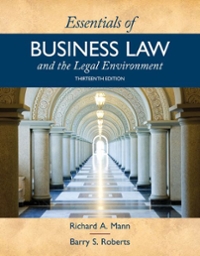On October 20, 1999, a group of nineteen private organizations filed a rulemaking petition asking the Environmental
Question:
On October 20, 1999, a group of nineteen private organizations filed a rulemaking petition asking the Environmental Protection Agency (EPA) to regulate greenhouse gas emissions from new motor vehicles under the Clean Air Act. Fifteen months after the petition’s submission, the EPA requested public comment on all the issues raised in the petition, adding a “particular” request for comments on
“any scientific, technical, legal, economic or other aspect of these issues that may be relevant to EPA’s consideration of this petition.” The EPA received more than fifty thousand comments over the next five months. On September 8, 2003, the EPA entered an order denying the rulemaking petition.
The agency gave two reasons for its decision: (1) that contrary to the opinions of its former general counsels, the Clean Air Act does not authorize the EPA to issue mandatory regulations to address global climate change and (2) that even if the agency had the authority to set greenhouse gas emission standards, it would be unwise to do so at this time. In concluding that it lacked statutory authority over greenhouse gases, the EPA observed that Congress
“was well aware of the global climate change issue when it last comprehensively amended the [Clean Air Act] in 1990,” yet it declined to adopt a proposed amendment establishing binding emissions limitations.
Calling global warming “the most pressing environmental challenge of our time,” twelve states, local governments, and private organizations alleged that the EPA had abdicated its responsibility under the Clean Air Act to regulate the emissions of four greenhouse gases, including carbon dioxide, and challenged the decision. Explain whether the states, localities, and organizations or the EPA are correct.
Step by Step Answer:

Essentials Of Business Law And The Legal Environment
ISBN: 9781337555180
13th Edition
Authors: Richard A Mann, Barry S Roberts





